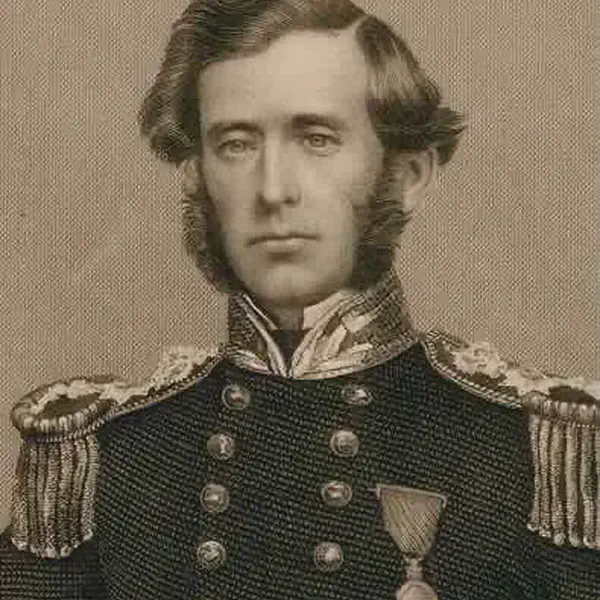
Sir Francis Leopold McClintock, British Naval Officer and Explorer, Died.
November 14, 1903
Sir Francis Leopold McClintock KCB FRS (8 July 1819 – 17 November 1907) was an Irish explorer in the British Royal Navy, known for his discoveries in the Canadian Arctic Archipelago. He was born at Dundalk, Ireland, on the 8th of July 1819, of a family of Scottish origin. He entered the navy at the age of twelve, and for his conduct in recovering the Gorgon, when it was stranded near Montevideo, was promoted to a lieutenancy in 1845.
He accompanied Sir James Ross in one of the three arctic expeditions sent out in search of the lost expedition of Sir John Franklin in the spring of 1848, and early in the following year joined another expedition under Captain Austin. On this voyage and on the Franklin search expedition (1850?51) under Capt. Horatio Austin, McClintock learned and developed the Eskimo art of sledging.
On the Austin expedition he mapped much of the south coast of Melville Island; while on Sir Edward Belcher?s expedition (1852?54), he discovered and mapped most of Prince Patrick Island. In 1857, Lady Franklin placed him in command of the Fox, in which he set forth in search of more definite knowledge of Franklin?s fate.
The Fox remained in the Arctic until 1859; McClintock discovered the channel that bears his name, explored Prince of Wales Island and the east coast of King William Island, and sledged to Boothia Peninsula. He found records that disclosed that Franklin and his party had left their ships alive and had begun the march toward Hudson Bay.
McClintock also proved that Franklin had found the existence of the Northwest Passage before he perished. The account of McClintock?s findings was published as The Voyage of the Fox (1859), which achieved great popularity. He retired from the navy in 1884 with the rank of admiral.
Arctic Exploration: McClintock participated in several Arctic expeditions in search of the Northwest Passage. He joined Sir James Clark Ross’s expedition (1839–1843) aboard HMS Terror and HMS Erebus, which explored parts of the Arctic.
Search for the Franklin Expedition: In 1857, McClintock led the Fox expedition, sponsored by Lady Franklin, the widow of Sir John Franklin. The expedition discovered artifacts and documents on King William Island that confirmed the fate of the Franklin Expedition. The findings included a note revealing that Franklin had died in 1847 and the ships were abandoned.
Innovations in Exploration: McClintock is credited with introducing innovative methods in Arctic exploration, including the use of sledges, dog teams, and the Inuit technique of using sledges with runners. These innovations significantly improved the mobility of Arctic expeditions.
Later Career and Honors: After his Arctic expeditions, McClintock continued his naval career, eventually reaching the rank of Admiral. He received various honors for his contributions to exploration, including being knighted and awarded the Founder’s Gold Medal by the Royal Geographical Society.
Legacy: Sir Francis Leopold McClintock’s contributions to Arctic exploration and his role in solving the mystery of the Franklin Expedition significantly advanced the understanding of the Arctic region. His leadership and use of indigenous knowledge were instrumental in the success of his expeditions.